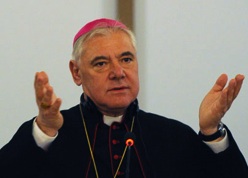Vatican Diary / at the Holy Office, a Double-faced Janus
The Chiesa
Before switching to the evocative setting of the pontifical villas of Castel Gandolfo for the customary summer break, Benedict XVI has given approval to a small but significant round of appointments in the Vatican curia. The main move concerns the change at the top of the congregation for the doctrine of the faith. Pope Joseph Ratziner has selected as his second successor after the American William J. Levada the Bavarian bishop Gerhard Ludwig Muller, 65 years old next December 31, since 2002 the bishop of Regensburg. The new head of what used to be called the Holy Office has a reputation as a double-faced Janus. On the one hand, above all in his country, he is considered one of the most conservative prelates on the field. It is no coincidence that the Swiss-German theologian and priest Hans Kung has called this decision "catastrophic." In 2005, for example, Muller reformed "in spite of the contrary wind whipped up by the media" the system of pastoral councils in his diocese, prompting numerous criticisms among the progressives, who complained of a reduction of the role of the laity, and provoking a canonical recourse against the decision, which he won in a definitive manner with a decree of the apostolic signatura in 2007. In an interview in "Mittelbayerische Zeitung" on July 6, Muller reiterated the official stance of the Church on pastoral care for the divorced, without venturing into hypothetical changes. He explained that "the office of the bishop also implies conflict." And he remarked that "the understandable human desire to be recognized by all as the good uncle is not the best basis for a good appointment" of a bishop. In short, Muller cannot be numbered among the bishops who seek easy applause. And this applies to the left, but also to the right of the ecclesial ranks. Moreover, in fact, above all in circles of the Roman curia and in the traditionalist world, some of Muller's theological affirmations are looked upon with the greatest suspicion, and above all his decades-long friendship, never repudiated, with the honorary father of liberation theology, the Peruvian Gustavo Gutierrez (who entered the Dominican order in the province of France based in Paris – more progressive than that of Toulouse – in 2001, at the age of 73, after in 1999 Juan Luis Cipriani Thorne of Opus Dei was appointed archbishop of the archdiocese of Lima, where he had been incardinated since 1959). To the accusations of being a "liberal" theologian, also raised by the fact of having had Karl Lehmann as a guest lecturer in his academic courses, Muller replied – again in ""Mittelbayerische" – by declaring himself to be such, but in the sense given to the word by Saint Thomas Aquinas, when he wrote that "Deus maxime liberalis est." To the criticisms from the traditionalist side, a reply has come, in Muller's defense, from Fr. Nicola Bux, an adviser to the congregation for the doctrine of the faith and certainly beyond suspicion of progressive sympathies. In an interview with "Vatican Insider," Bux contextualized the statements about transubstantiation and the virginity of Mary that have come into the crosshairs of Muller's critics. Not persuading them much, judging by the continuation of the accusations. In any case, Benedict XVI has not allowed himself to be influenced by the criticisms and has opted for the bishop of Regensburg, certainly having appreciated his choice of the words "Dominus Iesus" as episcopal motto, the same words that make up the title of the 2000 declaration of the congregation for the doctrine of the faith on the salvific unicity of Christ, one of the documents most incredibly opposed within the Catholic Church, including the college of cardinals. The pope has granted Muller the privilege of allowing him to live in Rome in his own previous apartment from when he was a cardinal, in Piazza Citta Leonina, which still houses part of his library. This decision, of great symbolic and affective significance, may not be entirely unrelated to the fact that Muller is the editor of the publication of Ratzinger's Opera Omnia. Beyond the reactions and the commentaries, it will be interesting to see what mark Muller will make on two delicate questions that he will have to face right away. The two questions are the dialogue with the Lefebvrist world and the controversy with one segment of American women religious. There it will be possible to verify concretely Muller's level of continuity, or lack thereof, with respect to Levada, who, it must be recalled, when he was called in 2005 to the congregation for the doctrine of the faith, was himself considered too "liberal" by some conservative circles and too far to the right by more progressive groups.
|
.
Any original material on these pages is copyright © BishopAccountability.org 2004. Reproduce freely with attribution.
